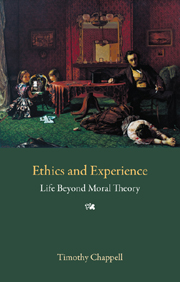Book contents
- Frontmatter
- Contents
- Acknowledgements
- 1 The turn to reason: how human beings got ethical
- 2 Demarcation: what does “ethical” mean?
- 3 Motivation: why be moral?
- 4 Deliberation: the question of reason
- 5 Introducing subjectivism and objectivism
- 6 Five arguments for ethical subjectivism
- 7 The content of ethics: expressivism, error theory, objectivism again
- 8 Virtue ethics
- 9 Utilitarianism
- 10 Kantianism and contractarianism
- 11 Theory and insight in ethics
- Further reading
- Bibliography
- Index
11 - Theory and insight in ethics
- Frontmatter
- Contents
- Acknowledgements
- 1 The turn to reason: how human beings got ethical
- 2 Demarcation: what does “ethical” mean?
- 3 Motivation: why be moral?
- 4 Deliberation: the question of reason
- 5 Introducing subjectivism and objectivism
- 6 Five arguments for ethical subjectivism
- 7 The content of ethics: expressivism, error theory, objectivism again
- 8 Virtue ethics
- 9 Utilitarianism
- 10 Kantianism and contractarianism
- 11 Theory and insight in ethics
- Further reading
- Bibliography
- Index
Summary
I will not stir a finger to compress the world into a system, and it does not at present seem as if it was going to harmonise itself without compression.
(Sidgwick, Letters, quoted in Williams 1995a: 159)A smart set of concepts may be a most efficient instrument of corruption.
(Murdoch 1970: 33)The will to system is a lack of integrity.
(Nietzsche, Twilight of the Idols: “Maxims and Arrows”, [1889] 1968: 25)The very idea of a moral theory
At the beginning of this book I defined ethics as the use of reason to determine an answer to Socrates' question how life should be lived. That definition immediately raised the question: what sort of use of reason? If reason applies to the question “How should life be lived?”, how does reason apply to it?
Part of what is involved in applying reason to Socrates' question is a matter of working out what kind of justification, and what kind of truth or falsehood, any answer to that question could have. This was my concern in Chapters 5–7, where we looked at arguments for and against ethical subjectivism and objectivism. Another part of what is involved is the description and assessment of the various possible moral theories that might guide us in our choices about how to live. This has been my focus in Chapters 8–10.
- Type
- Chapter
- Information
- Ethics and ExperienceLife Beyond Moral Theory, pp. 184 - 214Publisher: Acumen PublishingPrint publication year: 2009

